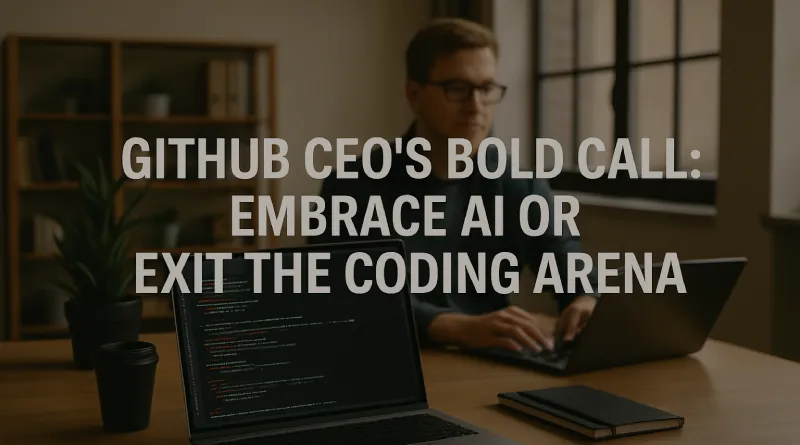GitHub CEO’s Bold Call: Embrace AI or Exit the Coding Arena
GitHub CEO Thomas Dohmke wrote a controversial call to arms to all developers to wake up and embrace artificial intelligence (AI) or face being left behind in the current changing technological sphere. As characterised by Dohmke in his August 5, 2025 blog post, “Developers, Reinvented”, Dohmke concludes that, “The proof is in the pudding: Embrace AI, or jump ship out of this profession.” This grim caution is based on the experiences of 22 experienced developers who use AI, and illustrates a tectonic transformation in the practice of software development, in which an AI-powered tool such as GitHub Copilot is diminishing the role of the developer as a traditional coder and taking over as strategic overseer. With the tech industry of India, which is worth $200 billion (NASSCOM, 2025), preparing itself towards this change, its 1.5 million professionals in AI and machine learning (AICTE, 2024) have much to consider.
The AI-Driven Evolution of Coding
Dohmke bases his message on research he had been conducting on developers who had made the switch between AI skeptics to AI partners and tools that automated many routine processes, such as debugging and boilerplate code generation. These developers have become what can be referred to as code enablers, or creative directors, who pilot AI systems, develop prompts and validate their results, as opposed to writing code line by line. Dohmke contends this shift is not one of doing less work but having a higher ambition level- taking on challenging projects with intricate nature such as large scale refactoring or multi-agent workflows that were previously considered a nightmare.
The information supports this shift: programmers say a computer program will generate 90 percent of the code in two to five years, a forecast repeated throughout interviews reported by India Today. Early adopters attribute job satisfaction and aspirations as seen in the ability of AI to promote boundaries as opposed to human genius. Resistance is likely to result in obsolescence; this is the words of warning proposed by Dohmke and validated by a similar statement to the effect that using AI is no longer optional by Microsoft executive Julia Liuson.

Unique Insights: A New Skill Paradigm
This shift reroutes the value of developers, which is no longer tied to mastering the syntax and now to architecting systems, to working with AI, and to quality-assurance. The vision Dohmke puts forward of developers using AI as AI strategists, who direct multi-agent systems, brings a different twist: the AI is an ally not a colleague. This might trigger innovation in India where 40% of AI startups flourish in Bengaluru (Tracxn, 2024), although it will also necessitate upskilling. Internet users in the country boast 900 million users (Statista, 2025), and solutions based on AI would be profitable to them; however, most AI models are (at present) biased by Western bias (NASSCOM, 2024). It would be necessary to train the models locally.
Local Context: India’s Tech Landscape
There is an opportunity and a challenge to the IT workforce within India, which has 5.4 million employees (IBEF, 2024). Technology powerhouses such as Hyderabad and Pune, are likely to be on the frontier of AI adoption; however, with 30 percent of those not having access to reliable internet (NITI Aayog, 2024) rural areas may face marginalisation. X posts by @TechIndia convey excitement with @CodeWithRavi promoting AI classes, with on the other hand users such as @DevConcerned fearing losing employment. This call by Dohmke is in conformity with the 2026 AI-Governance Framework India initiative (MeitY) that seeks to balance between innovation and transition of workforce.
The Future of Software Development
According to Dohmke, in the future developers will be busy with more advanced work as AI will take over most coding. Such is equal to the world trends, and 46 percent of U.S. developers are already using AI tools (GitHub Octoverse, 2024). In education, the critical change is taking place in India where the coding bootcamps rose by 25 percent back in 2024 (NASSCOM). To illustrate further, Dohmke prescribes a curriculum focused around AI orchestration and critical thinking as opposed to the typical syntax practice, which India is having to switch to with its 300,000 annual computer science graduates ( AICTE, 2024).
Practical Steps for Developers
- Learn AI Tools: Master GitHub Copilot or similar platforms through online courses (e.g., Coursera’s AI for Everyone).
- Upskill in Strategy: Focus on system architecture and prompt engineering via platforms like Udemy.
- Collaborate Early: Experiment with AI in personal projects to build confidence.
- Stay Updated: Follow GitHub’s developer blog for evolving best practices.
Challenges and Criticisms
Not all welcome this shift. Some developers, as noted by Business Insider, find managing AI less fulfilling than hands-on coding, viewing Dohmke’s tone as a scare tactic to boost adoption. Critics on X, like @OpenSourceDev, argue it pressures mid-career professionals without retraining support. In India, where 70% of tech jobs require five+ years of experience (PwC, 2024), this could widen the skills gap, necessitating government or corporate reskilling programs.
Broader Implications
This reinvention could democratize tech innovation, enabling India’s startups—raising $1.2 billion in 2024 (Tracxn)—to compete globally. However, ethical risks, like biased AI outputs, require oversight, aligning
Disclaimer
The information presented in this blog is derived from publicly available sources for general use, including any cited references. While we strive to mention credible sources whenever possible, Web Techneeq – Website Developer in Mumbai does not guarantee the accuracy of the information provided in any way. This article is intended solely for general informational purposes. It should be understood that it does not constitute legal advice and does not aim to serve as such. If any individual(s) make decisions based on the information in this article without verifying the facts, we explicitly reject any liability that may arise as a result. We recommend that readers seek separate guidance regarding any specific information provided here.

